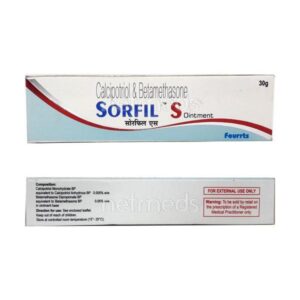BETAMETHASONE + CALCIPOTRIOL
Betamethasone: Betamethasone is a corticosteroid medication that is used to reduce inflammation and relieve symptoms associated with various health conditions. It belongs to a class of drugs called glucocorticoids.
Its primary mechanism of action is to inhibit the release of inflammatory substances in the body, such as prostaglandins and leukotrienes. By doing so, it helps to reduce redness, swelling, itching, and other symptoms of inflammation.
Betamethasone can be used to treat a variety of conditions, including allergic reactions, skin disorders (such as eczema and psoriasis), arthritis, asthma, and certain types of cancer. It is available in various forms, including creams, ointments, lotions, gels, and liquid solutions.
The dose of Betamethasone varies depending on the condition being treated and the patient’s age and severity of symptoms. It is typically applied topically to the affected area of the skin, following the instructions provided by a healthcare professional. The frequency of application and duration of treatment will be determined by the specific condition.
As with any medication, Betamethasone can cause certain side effects. Common side effects include skin irritation, dryness, burning, and itching at the site of application. Prolonged use or excessive dosage can lead to skin thinning, stretch marks, and increased vulnerability to infections. In rare cases, systemic absorption of the medication can occur, resulting in more severe side effects, such as adrenal suppression, Cushing’s syndrome, and increased blood sugar levels.
It is important to follow the instructions provided by a healthcare professional and to use Betamethasone only as directed. Inform your healthcare provider about any existing medical conditions or other medications you are taking before using Betamethasone.
Calcipotriol: Calcipotriol is a synthetic form of vitamin D3, commonly used in the treatment of psoriasis. It is available as a topical cream or ointment and works by regulating the growth and development of skin cells.
The precise mechanism of action of calcipotriol in psoriasis is not fully understood. However, it is known to bind to vitamin D receptors on epidermal cells, which leads to the normalization of keratinocyte differentiation and a reduction in inflammation.
Calcipotriol is typically applied once or twice daily to the affected area of the skin. The exact dosage and duration of treatment will depend on the severity of the condition and the individual’s response to therapy. It is important to follow the instructions provided by the healthcare professional or the medication’s label.
Common side effects of calcipotriol include skin irritation, such as redness, burning, itching, or stinging at the application site. These side effects are usually mild and temporary. Less frequently, skin dryness, irritation, or blistering may occur. If any of these side effects persist or worsen, it is recommended to consult a healthcare provider.
Calcipotriol should not be used on the face, as it may cause skin irritation. Additionally, it is not recommended for use on large areas of the body due to the risk of absorbing too much vitamin D. It is important to avoid excessive sun exposure or the use of tanning beds while using this medication, as it may increase the risk of skin irritation or sunburn.
Overall, calcipotriol is a well-tolerated and effective therapy for the treatment of psoriasis. However, it is always recommended to consult with a healthcare professional before starting any new medication.

